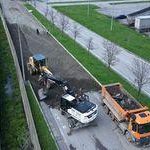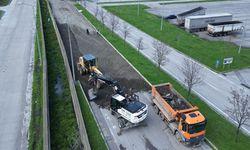Movement of goods plays a crucial role in today’s economy. It connects producers with consumers, ensuring that products reach their destinations efficiently. Without effective transportation, businesses face significant challenges. Disruptions could lead to delays, lost revenues, and dissatisfied customers. Each element in this intricate system is interdependent, creating a dynamic environment.
Flatbed trucks, trailers, and cargo carriers are seen as more than just vehicles; they are vital links in this vast network. Every delivery involves meticulous planning, coordination, and execution, all aimed at optimizing transit times. Companies rely on various modes of transport, and freight companies implement strategies to maximize efficiency.
In this ever-evolving landscape, understanding new technologies, regulations, and market trends is essential. Competitors are constantly adapting to changing demands. Efficiency becomes paramount, leading to innovations that reshape traditional methodologies. Logistics managers continuously evaluate processes to enhance performance.
In navigating complexities present in freight movement, businesses must stay agile and responsive. Success hinges on their ability to adapt to market fluctuations. By fostering strong partnerships and leveraging data analytics, organizations can streamline operations. This ultimately leads to enhanced service delivery and greater customer satisfaction.
Understanding Trucking in the Supply Chain

Transportation plays a vital role in connecting various components within a business ecosystem. It serves as a bridge between producers and consumers, ensuring products reach their final destinations efficiently. Movement of goods is critical. It impacts the speed of deliveries and overall customer satisfaction. Beyond simply moving items, this sector handles logistics challenges, route optimization, and cargo safety.
In a world where immediacy is key, speed and reliability are absolute necessities for success. Vehicles transport a variety of products, ranging from perishable goods to heavy machinery. The ability to adapt to differing needs is crucial in maintaining operational efficiency. The complexity of regulations also adds another layer of challenge that must be navigated.
From local deliveries to cross-country hauls, diverse vehicle types cater to specific requirements, each with unique logistics considerations. Efficient routing leads to cost savings, reducing fuel consumption while maximizing delivery performance. Moreover, advancements in technology enhance tracking capabilities, making it easier for businesses to monitor shipments in real time.
Ultimately, effective transportation management influences a company’s competitiveness in today’s fast-paced market. Every decision made within this realm can dictate success or failure, highlighting the importance of choosing the right partners and tools. The intersection of planning and execution defines the potential of any enterprise aiming to excel in this dynamic environment.
Role of Trucks in Supply Chains

Vehicles serve as crucial vessels for transporting goods across vast distances. They enable industries to deliver products efficiently and reliably. The movement of cargo relies heavily on these automotive solutions. They connect manufacturers, wholesalers, and retailers seamlessly, ensuring that consumer needs are met promptly.
Every day, trucks traverse numerous routes, facing various challenges. From traffic congestion to weather conditions, the road can be unpredictable. However, their adaptability makes them an indispensable asset. The ability to reach remote areas and urban centers alike showcases their versatility and importance in logistics. While larger freight options exist, road transportation remains a primary form of distribution for countless businesses.
Moreover, trucks play a vital role in just-in-time strategies, minimizing inventory costs and streamlining operations. With real-time tracking technologies, businesses can monitor their deliveries closely. This enhances transparency and allows for proactive decision-making in case of disruptions. Such integration not only improves efficiency but also fosters better customer relationships.
In conclusion, these mobile carriers are the backbone of logistics operations. Without them, many sectors would face significant delays and increased expenses. Their significance in fostering economic growth cannot be underestimated. Thus, ensuring the efficiency and effectiveness of truck transport is paramount for any operational success.
Importance of Freight Transportation
Efficient movement of goods plays a vital role in today’s economy. It connects producers with consumers across vast distances. Reliable logistics is crucial for businesses, ensuring products reach their destinations on time. This sector influences various industries, impacting growth and profitability. Without effective freight solutions, many operations would suffer significantly.
Transportation of cargo is not merely about movement. It’s about integrating various elements in a cohesive method. Various factors contribute to the overall success of this process. Timing, cost, and reliability are paramount. Consider how essential it is for retailers to restock their shelves regularly.
- Cost-effectiveness in delivery
- Flexibility in transportation options
- Improved customer satisfaction
These benefits collectively enhance competitiveness in a crowded market, allowing businesses to adapt quickly to changes in demand and maintain strong relationships with customers.
Moreover, freight transportation supports economic development. It facilitates trade between regions and countries, allowing for greater access to goods. This contributes to job creation, as well as overall market growth. In addition, efficient logistics minimize delays, further enhancing productivity.
- Cargo movement enables just-in-time inventory systems.
- It aids in expanding business reach beyond local markets.
- Provides access to new suppliers and customers.
Therefore, recognizing the critical nature of efficient freight transport is essential for any modern enterprise. The ability to streamline logistics influences operational success across multiple sectors. A well-structured freight network not only benefits individual businesses but also contributes to the growth of the economy as a whole.
Impact on Delivery Speed
The speed of delivery plays a crucial role in customer satisfaction. A swift delivery can differentiate a brand in a competitive market. Timeliness fosters trust and can significantly influence purchasing decisions. When logistics operate seamlessly, products reach consumers faster, leading to repeat business. Delays, on the other hand, can tarnish a company’s reputation.
Factors such as route optimization, traffic conditions, and vehicle maintenance directly affect efficiency. Each element has its significance. When all components align, timely deliveries become routine. However, a single hiccup in the system can cause significant delays, resulting in a cascade of consequences. This ripple effect highlights the importance of proactive management across all logistical operations to ensure customers receive their orders as quickly as possible.
Integration with Other Modes of Transport
Seamless connections between various transport methods are crucial for efficiency. Different systems complement each other, creating a robust network. Each mode has its strengths and weaknesses. Finding a balance enhances overall logistics performance. This interconnectedness plays a vital role in timely deliveries and minimal disruptions.
Rail, air, and maritime transport each offer unique advantages. For instance, rail is often cost-effective for long distances. Air transport ensures swift deliveries but at a higher cost. Meanwhile, maritime options handle bulk shipments efficiently. When combined, these modes create a versatile transport matrix that addresses diverse logistical needs.
Effective coordination is necessary to optimize overall performance. Communication between transport managers is key. Real-time data sharing enhances decision-making capabilities. Each transport method can strategically support others during peak times. This synergy fosters agility and resilience within logistics operations.
A combined approach enhances service levels and customer satisfaction. Customers benefit from faster deliveries and greater flexibility. A cohesive strategy simplifies the management of complex logistical challenges. It allows businesses to respond swiftly to changing market demands. By integrating various transport modes, organizations can achieve significant competitive advantages.
Challenges Faced by Trucking Companies
Numerous hurdles exist for those in the freight transport sector. Rising costs, regulatory demands, and fierce competition can create significant strain. Companies often struggle with finding skilled drivers. Additionally, maintaining a reliable fleet is crucial yet challenging. Issues can arise from vehicle breakdowns and maintenance expenditures.
Regulatory compliance presents a multifaceted challenge, growing increasingly complex as safety standards and environmental regulations evolve. Navigating these rules requires considerable resources and expertise, often diverting attention away from core operations. Moreover, fluctuating fuel prices can serve as a double-edged sword, impacting profit margins without warning.
Recruitment is another critical aspect. A persistent shortage of qualified drivers affects the ability to meet delivery deadlines. Many organizations grapple with high turnover rates, complicating workforce stability. Employee retention strategies are vital for building a committed team. However, combating driver fatigue and ensuring job satisfaction remains a priority for management.
Technology adoption poses another set of obstacles. While advancements can enhance efficiency, the costs associated with integrating new systems can be prohibitive. Training staff to utilize these technologies effectively also requires time and financial investment. Additionally, cyber threats have become more prevalent, demanding robust security measures to protect sensitive data.
Weather conditions frequently disrupt operations, creating unpredictability for schedules and delivery times. Companies must remain agile and responsive to changing circumstances. Ultimately, those in freight transport must navigate a landscape filled with challenges, adaptability and innovation will be essential for success moving forward.
Trends in the Trucking Industry
The freight transportation landscape is in a constant state of evolution. Innovations are reshaping how goods are delivered. Emerging technologies play a significant role. Drivers and logistics managers are adapting to these changes. Each trend brings new challenges and opportunities.
One prominent movement is the digitization of operations. Many companies are adopting software solutions for route planning. This shift enhances efficiency and reduces costs. Moreover, data analytics is becoming indispensable in decision-making. By harnessing real-time information, firms can optimize their supply routes and improve delivery times.
Another noteworthy trend is a growing focus on sustainability. As environmental concerns escalate, businesses are seeking greener alternatives. Electric and hybrid vehicles are becoming popular choices. Companies aim to reduce their carbon footprints while maintaining performance. The industry is witnessing a rise in eco-friendly initiatives that promote responsible practices.
In addition, there’s a shift towards automation in transportation. Autonomous vehicles are no longer just a concept; they’re becoming a reality. With advancements in AI, autonomous trucks promise to increase safety and efficiency. However, this development raises questions about workforce implications and regulatory frameworks. The transition to automated systems will require careful consideration and strategic planning.
Finally, workforce challenges continue to affect this sector significantly. A shortage of skilled drivers is a pressing issue. Companies are exploring recruitment strategies and training programs to address this gap. Competitive salaries and flexible work schedules help attract talent. Retaining drivers also amounts to a crucial component of long-term success in this evolving environment.
Emerging Technologies and Innovations
Innovations are reshaping logistics on a global scale. New tools and techniques are enhancing efficiency. Fresh solutions emerge regularly, offering advantages in multiple areas. From autonomous vehicles to advanced tracking systems, the landscape is vibrant and dynamic.
The integration of cutting-edge technology can streamline operations significantly. It helps in reducing costs and improving service delivery. Additionally, companies are better equipped to make informed decisions. Data analytics plays a pivotal role here.
Take, for instance, the implementation of artificial intelligence (AI) in route optimization, which allows businesses to analyze real-time data quickly and adjust plans accordingly.
Moreover, blockchain technology is gaining traction for its ability to create transparent and secure transactions. This fosters trust among stakeholders, as every movement within the network is easily traceable.
Another groundbreaking advancement is the rise of the Internet of Things (IoT). This technology offers connectivity, enabling vehicles to communicate with each other and infrastructure.
| Technology | Description | Benefits |
|---|---|---|
| AI | Route optimization and predictive analytics | Cost savings, time efficiency |
| Blockchain | Secure transaction records | Transparency, trust enhancement |
| IoT | Connected devices for real-time data exchange | Improved decision-making, safety |
All these advancements lead to smarter decision-making processes. As businesses adopt these modern approaches, they can expect improved operational performance. Staying updated with trends is vital for competitive advantage. Embracing innovation fosters a robust environment for growth and success.
Sustainability and Environmental Practices
Modern logistics operations increasingly prioritize ecological responsibility. This shift reflects a growing awareness of the effects of commerce on our planet. Companies strive to implement practices that lessen their carbon footprint. Through innovative strategies, organizations seek to foster a greener future.
Reducing fuel consumption is one significant goal. Efficient routing can cut unnecessary miles. Investments in alternative energy sources also play a vital role. Many are exploring the potential of electric vehicles in logistics.
By opting for sustainable materials, firms minimize waste. Not only that, but recycling initiatives further contribute to environmental preservation. Moreover, partnerships with eco-conscious suppliers enhance overall sustainability efforts.
All these actions create a positive ripple effect throughout the sector. This commitment not only benefits the environment but also appeals to consumers who value sustainability.
Through collaborative engagement and continuous innovation, businesses are carving out pathways forward that embody responsibility and efficiency. Striving for long-term viability is not just an option anymore; it is essential for future success.
Regulatory Changes and Compliance
Regulations and compliance requirements significantly impact logistics operations. Staying abreast of legal standards is crucial for any company in this sector. Changes can arise unexpectedly, often requiring swift adjustments. This landscape must be navigated carefully. Adapting to new rules benefits both business and safety.
Compliance encompasses various facets, including safety protocols, environmental regulations, and financial reporting obligations. Interested parties must grasp the implications of these requirements.
- Safety regulations ensure drivers and cargo remain secure.
- Environmental laws mandate reduced emissions and sustainable practices.
- Financial compliance facilitates transparency and accountability across operations.
Failure to comply with these evolving standards can lead to severe penalties, which might include hefty fines or even operational shutdowns, thus underscoring the importance of staying informed about shifting regulations and implementing proactive strategies to maintain compliance and minimize risks that could impact overall efficiency and effectiveness.
Moreover, stakeholders should invest in training programs. Such initiatives ensure all employees are knowledgeable about current regulations. Frequent updates and workshops can enhance understanding significantly. Legal experts or consultants may also provide valuable insights. When businesses prioritize regulatory adherence, they instill confidence in customers.
- Establish a compliance framework within operations.
- Monitor industry developments regularly.
- Incorporate feedback from employees on challenges faced.
In conclusion, maintaining compliance with regulations is not merely a legal obligation; it represents a commitment to professionalism and a safer working environment, which ultimately contributes to the long-term success and sustainability of any organization engaged in logistics.
Video:
What is logistics ? Logistics definition and 7 right of logistics explained!
What is logistics ? Logistics definition and 7 right of logistics explained! by Daily Logistics 135,064 views 3 years ago 6 minutes, 4 seconds
Q&A:
What are the primary roles of trucking in the supply chain?
Trucking plays a critical role in the supply chain as it is responsible for the movement of goods from one location to another, particularly in the first and last miles of delivery. It provides flexibility and accessibility, allowing for efficient transport of products from suppliers to warehouses and ultimately to retailers or end customers. Additionally, trucking helps in reducing lead times, maintaining inventory levels, and ensuring that products reach their destination in a timely manner, which is essential for meeting consumer demand.
How does the trucking industry impact overall logistics costs?
The trucking industry significantly impacts logistics costs, as it often constitutes a considerable portion of the total transportation expenses for businesses. Factors like fuel prices, driver wages, and maintenance costs can fluctuate, affecting overall costs. Moreover, the efficiency of trucking operations, such as route optimization and load maximization, can lead to substantial savings. Businesses must consider these factors when planning their logistics strategies to ensure cost-effectiveness and competitiveness in the market.
What are the main challenges faced by trucking companies in the supply chain?
Trucking companies face a variety of challenges including driver shortages, regulatory compliance, fluctuating fuel prices, and increasing operational costs. The demand for timely deliveries requires effective fleet management and technology integration, which can pose additional difficulties. Furthermore, handling unpredictable factors like weather delays, traffic congestion, and supply chain disruptions also complicate operational efficiency. Addressing these challenges is crucial for trucking companies to maintain service levels and profitability.
How has technology transformed the trucking sector within the supply chain?
Technology has revolutionized the trucking sector by enhancing efficiency, transparency, and communication. Innovations such as GPS tracking, route optimization software, and electronic logging devices (ELDs) enable companies to monitor vehicle performance and ensure compliance with driving regulations. Furthermore, advancements in data analytics allow for better decision-making and predictive maintenance. Emerging technologies like autonomous trucks and artificial intelligence are also being explored, which could further streamline operations and reduce costs in the future.
What role does sustainability play in trucking and the supply chain?
Sustainability is becoming increasingly important in the trucking industry as businesses seek to reduce their carbon footprints and promote environmentally friendly practices. Companies are exploring alternative fuel sources, such as electric and hybrid trucks, to minimize greenhouse gas emissions. Additionally, optimizing routes and improving load efficiency can lead to lower fuel consumption. Emphasizing sustainability not only helps in meeting regulatory requirements but also enhances brand reputation and can lead to cost savings in the long run, as consumers and clients increasingly favor environmentally responsible practices.

















